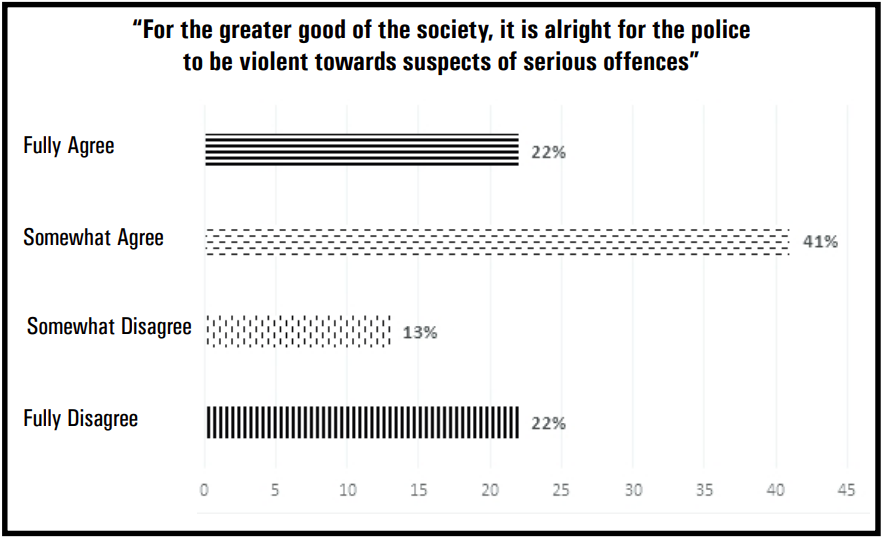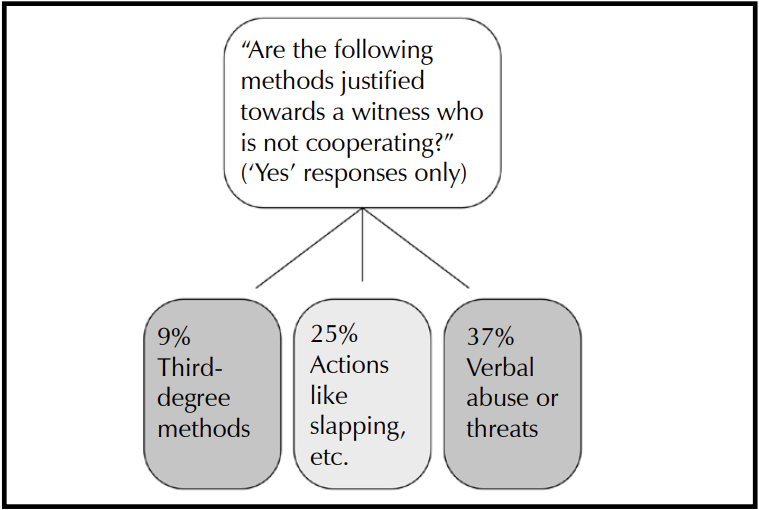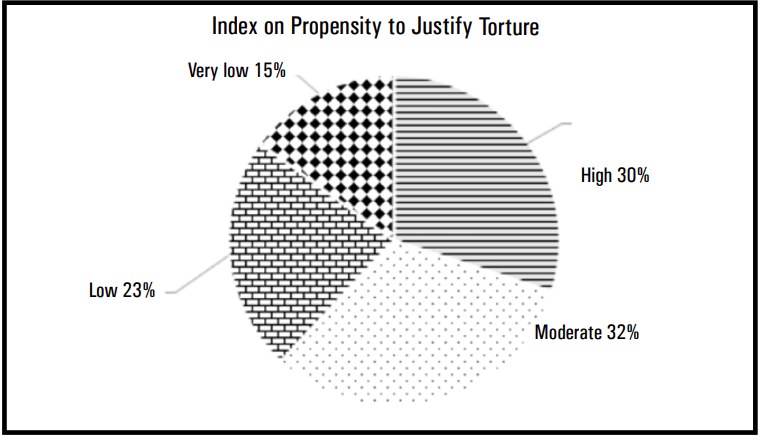Justifying Violence and Torture In Custody
Against Accused and Non-Accused Persons
In India, there is no domestic torture prevention law that defines, deters, and punishes the use of torture. While India has signed the UN Convention Against Torture, we have failed to ratify the Convention or enact a domestic law. In the absence of a comprehensive definition for torture, there exists wide and arbitrary interpretations of what constitutes torture, and importantly what is “not torture”, with no coherence or consensus across the justice system and society at large.
In this article, we present some extracts from Chapter 5 of the report. This chapter looks at the extent to which police justify torture. It poses questions that cover a range of coercive and violent techniques— from verbal threats to slapping to ‘third-degree’ to torture. The chapter also explores the justifications for the use of coercive and violent tactics against non-accused persons who come in contact with the police. Lastly, it captures police perceptions on the frequency of coercive or violent tactics being used by Investigating Officers.
Importance of Legal Procedures
When asked if it is alright for the police to be violent towards suspects of serious offences for the “greater good of society”, 22 percent of police personnel “fully agreed”, while another 41 percent “somewhat agreed”. Thirteen percent “somewhat disagreed” and 22 percent “fully disagreed” (Figure 1). This goes on to show that nearly two out of every three police personnel are alright with the use of violent methods against suspects of serious offences. Support for such violence remains consistent across ranks, with 24 percent constabulary personnel, 23 percent IPS officers, and 19 percent upper subordinate personnel “fully agreeing” that it is alright to be violent towards suspects of serious offences.
Figure 1: Nearly two out of three police personnel feel that it is alright for the police to be violent towards suspects of serious offences for the greater good of the society

Note: All figures are in percentages. The rest did not respond.
Question asked: Do you agree or disagree with the following statement: “For the greater good of the society, it is alright for the police to be violent towards suspects of serious offences.”
Support for Use of Violent Tactics
When the police personnel were asked if the use of verbal abuse or threats, actions like slapping, etc., and third-degree methods are justified during investigations, 30 percent police personnel justified the use of ‘third-degree methods’ towards accused in serious criminal cases, while 9 percent felt that the use of third-degree methods was justified while investigating petty offences like theft, etc. As many as 49 percent of police personnel felt that the use of verbal abuse or threats were justified when investigating petty offences and the support rose to 55 percent when asked about serious criminal cases. One-third of the respondents (32%) also justified the use of actions like slapping, etc. in petty offences, while half the respondents (50%) justified it in serious criminal cases (Table 1).
| Nature of offence | “Are the following methods justified?” (‘Yes’ responses only) (%) | ||
| Verbal abuse or threats | Actions like slapping, etc. | Third-degreemethods | |
| Towards the accused while investigating petty offences like theft, etc. | 49 | 32 | 9 |
| Towards the accused while investigating serious criminal cases like rape, murder, etc. | 55 | 50 | 30 |
Note: All figures are in percentages. The rest either said that the above methods were not justified or did not respond.
Question asked: We often hear that the police use various tactics to solve criminal cases, such as verbal abuse, threats, physical force such as slapping, etc. or thirddegree methods. In your opinion, are these practices justified towards the following?
When disaggregated by the rank of the police personnel, IPS officers were the most likely to justify the use of ‘third-degree methods’, with 45 percent justifying its use when investigating serious criminal cases, while 32 percent personnel of the constabulary rank and 26 percent personnel of the uppers subordinate ranks support the use of third-degree methods in serious criminal cases. Officers who frequently conduct interrogation of suspects were also the most likely (33%) to justify the use of ‘third-degree methods’ towards suspects in serious criminal cases, compared to those who never conduct interrogations, who were the least likely to support it, at 20 percent.
Police personnel were also asked how often Investigating Officers (IOs) use ‘third-degree’ methods such as beating on soles, applying red chilli powder to body parts, suspension of the body, etc., to obtain information in serious offences. Eleven percent of the respondents said
Figure 2: Almost one in every ten police personnel justify the use of third-degree methods against an “uncooperative” witness

Note: All figures are in percentages. The rest either said that the above methods were not justified or did not respond.
Question asked: We often hear that the police use various tactics to solve criminal cases, such as verbal abuse, threats, physical force such as slapping, etc. or thirddegree methods. In your opinion, are these practices justified towards a witness who is not cooperating?
Figure 3: Thirty percent police personnel have a high propensity to justify torture

Note: All figures are in percentages. Please refer to Appendix 5 of the SPIR 2025 to see how the index was created.
Question asked: We often hear that the police use various tactics to solve criminal cases. In your opinion, are third-degree methods justified – a) towards the accused while investigating petty offences like theft, etc. b) towards the accused while investigating serious criminal cases like rape, murder, etc. c) towards a witness who is not cooperating?
Question asked: To what extent do you agree that torture is sometimes necessary and acceptable to gain information in the following kinds of cases - strongly agree, somewhat agree, somewhat disagree, or strongly disagree: major theft cases, rape or sexual assault cases, serious violent crimes like murder, crimes against national security like terrorism cases, and cases against history-sheeters?
Question asked: Suppose a minor girl has been kidnapped, and the suspect is not cooperating. In such a situation, how justified is it to use third-degree to locate the girl?
Question asked: In your opinion, how frequently do Investigating Officers have to use third-degree to obtain information in serious offences to deal with an uncooperative accused – many times, sometimes, once or twice, or never?
Officers who frequently conduct interrogation of suspects were also the most likely (33%) to justify the use of ‘third-degree methods’ towards suspects in serious criminal cases
One-third of IPS officers have a high propensity to justify torture, the highest across ranks. This is closely followed by 32 percent constabulary rank personnel
it is used “many times”, while 16 percent said that it is used “sometimes”. In contrast, a little more than half of the respondents (52%) said that it is “never” used. Those who often conduct interrogations were the most likely to report that such ‘thirddegree methods’ were being used frequently by the police (15%), compared to those who never conduct interrogations (3%).
Further, when asked about the support for use of torture in specific crime cases, 42 percent “strongly agreed” that torture was necessary and acceptable in crimes against national security, about one-third “strongly agreed” for its use in cases of rape or sexual assault and cases of serious violent crimes like murder (34% each), 28 percent “strongly” supported its use in cases against history-sheeters and 20 percent in major theft cases.
Use of Violent Tactics Against Non-Accused Persons
When shifting the focus from suspects to non-accused persons in a case, such as family members of accused or witnesses in a case, police’s support for the use of violence tactics against them is noteworthy. Eleven percent police personnel ‘strongly justify’ hitting/slapping family members of an absconding accused and 30 percent ‘somewhat justify’ it.
In case of “uncooperative” witnesses, 37 percent police personnel justify the use of verbal abuse or threats, 25 percent justify physical force such as slapping, etc., and 9 percent even justify the use of third-degree methods (Figure 2). IPS officers were the most likely (28%) to justify the use of third-degree methods against uncooperative witnesses, followed by constabulary rank officers at 10 percent and upper subordinate officers at eight percent.
Index on Propensity to Justify Torture
An index was created, using various questions from the survey on the use of torture and third-degree methods, to assess the propensity of police personnel to justify torture. The index indicated that overall 30 percent of police personnel have a ‘high’ propensity to justify torture, followed by 32 percent who have a ‘moderate’ propensity, 23 percent with ‘low’ propensity, and 15 percent with ‘very low’ propensity (Figure 3).
When disaggregated across ranks, it is found that one-third (34%) IPS officers have a high propensity to justify torture, the highest across ranks. This is closely followed by 32 percent constabulary rank personnel who have a high propensity, while a significantly lower proportion of 26 percent upper subordinate rank officers indicated a high propensity to justify torture. Consistent with previous trends, police officers who frequently conduct interrogations were also the most likely (37%) to have a high propensity to justify torture, while those who never conduct interrogations were the least likely to have a high propensity to justify torture, at 16 percent.
When assessing the propensity to justify torture across states, police personnel from Jharkhand and Gujarat have the highest propensities to justify torture—50 and 49 percent, respectively. In contrast, 73 percent police personnel from Kerala have a ‘very low’ propensity to justify torture.
Conclusion
Overall, this chapter presents alarming findings. It provides empirical evidence, across each subsection, that the police respondents support the use of violence and torture in many ways. Such support also extends to the use of these methods towards non-accused persons such as family members of accused, or witnesses. IPS officers in almost all states have a high propensity towards justifying the use of torture.
Suspects of serious offences are most vulnerable, with nearly two out of three police personnel agreeing that for the greater good of society, police need to be violent towards them. The data shows the trend that police officers who often conduct interrogations are significantly more inclined to justify the use of torture and third-degree.
NEXT »



